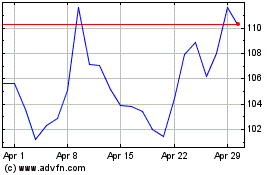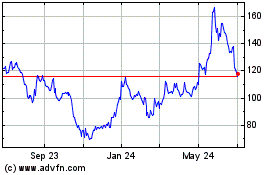By Joe Wallace and Julie Steinberg
An abrupt reversal in many of this year's most-persistent market
trends has hurt a cluster of computer-driven funds.
Caution gave way to euphoria in financial markets when Pfizer
Inc. and BioNTech SE said their coronavirus vaccine was more than
90% effective on Nov. 9. Shares of companies that have suffered in
the pandemic leapt, as did government-bond yields and energy prices
-- a pattern that repeated with the arrival of promising results
for Moderna Inc.'s vaccine Monday.
That was bad news for investors who aim to ride winning assets
higher and losing markets lower, a popular quantitative strategy
known as momentum investing. A gauge of performance by members of
the S&P 500 classified as momentum stocks slumped almost 14% on
Nov. 9, according to JPMorgan Chase & Co. That was the biggest
one-day loss for the grouping since at least the mid-1980s.
Among those caught out: A momentum fund run by AQR Capital
Management LLC that manages $3.4 billion in stock, bond, commodity
and currency futures. Class I shares in the mutual fund dropped
2.9% on the day of the Pfizer news, according to FactSet, one of
their worst days since inception in 2010. A spokesman declined to
comment.
AlphaSimplex Group LLC was another to feel the pain. Stung by
bets against oil and bond yields, as well as wagers on haven
currencies like Japan's yen, the firm's managed futures fund lost
2.6%, its second-biggest fall of 2020. Profitable bets on
agricultural commodities and stocks cushioned the blow, and the
fund is up over 7% for the year.
"We definitely got hit by that massive move in yields," said
portfolio manager Kathryn Kaminski. "Anything that had been your
friend throughout Covid was now coming back" to earth, she
added.
Though small, the losses demonstrate how funds that aim to
capitalize on existing trends are exposed when markets turn.
Momentum funds suffered in the spring of 2009, when the U.S. stock
market rebounded from the financial crisis.
"The problem with momentum investors is by definition they're
always going to crash at market turning points," said Yin Luo, vice
chairman for quantitative research at Wolfe Research LLC.
Sovereign-wealth funds and yield-starved European pension funds are
among the biggest momentum investors, gaining exposure through
asset managers and instruments sold by investment banks, he
added.
The blow also highlights the risks involved in piling into
crowded trades that investors exit en masse when prices turn
against them. This dynamic was one of the main reasons why
quantitative hedge funds that focus on stocks notched their worst
two-day performance since March last week, down 2.9%, according to
estimates from Goldman Sachs Group Inc.
Momentum funds weren't the only ones to be burned. Funds betting
on tech stocks that had benefited from the stay-at-home craze also
lost out last week. ARK Innovation ETF, with $10 billion in assets
under management, invests in companies benefiting from "disruptive
innovation" such as Spotify Technology SA, Slack Technologies Inc.
and Zoom Video Communications Inc. The fund was down 4.6% on Nov.
9. It fell 2.7% the following day before recovering more than 4% on
Nov. 11.
Investors in the recent rotation moved into stocks in industries
that "we believe are particularly at risk" of being upended long
term, said Ren Leggi, ARK's client portfolio manager, including
pharmaceuticals, banks, energy and automotive. He believes the
current rotation will be short lived as industry incumbents are
displaced, and that investors in value stocks might face more risk
than they have historically.
"Longer-term we expect the rotation to reverse and shift in
favor of innovation and growth," he added.
Proponents of momentum investing, such as AQR's billionaire
co-founder, Clifford Asness, point to evidence that the strategy
has paid off for over two centuries in the U.S. stock market.
Still, the past few years have been tough, in part because of a
series of shifts in stock-market leadership.
These reversals, involving rallies in value stocks such as banks
and energy producers that trade at low multiples of their net
worth, typically proved fleeting. They have tended to coincide with
sudden moves in bond yields, as in September 2019. Such is the
potential for vaccines to revive industries that languished during
the pandemic that many investors think the current rotation has
room to run.
Others don't think the rotation portends a significant shift,
and believe that value stocks in sectors such as retail were cheap
due to secular trends that Covid merely exacerbated. Either way,
some traders think investor positioning means more swings are in
store for stocks.
"There are still a lot of short positions in the market," said
Pierino Ursone, an options trader at Dutch firm Webb Traders.
Losses can be self-fueling. Trend-following algorithmic funds
rushed to close out losing wagers against crude oil, the FTSE 100
and other markets when prices jumped on Nov. 9, according to
analysis by Bridgeton Research Group LLC. Funds bought back futures
they had sold short when prices passed certain levels, giving them
a further boost.
Some allocators to hedge funds aren't worried. Jens Foehrenbach,
chief investment officer of Man FRM, a division of Man Group PLC
that allocates to hedge funds and advises on such investments, said
he isn't making changes to his strategy based on last week's
rotation. "Maybe it was a paradigm shift, maybe not. It doesn't
change our broader view" of the funds in which Man FRM is
invested.
Write to Joe Wallace at Joe.Wallace@wsj.com and Julie Steinberg
at julie.steinberg@wsj.com
(END) Dow Jones Newswires
November 18, 2020 05:44 ET (10:44 GMT)
Copyright (c) 2020 Dow Jones & Company, Inc.
Moderna (NASDAQ:MRNA)
Historical Stock Chart
From Mar 2024 to Apr 2024

Moderna (NASDAQ:MRNA)
Historical Stock Chart
From Apr 2023 to Apr 2024
